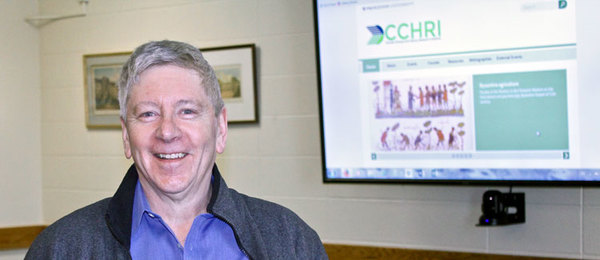Professor John Haldon Lectures on Landscape, Climate, and the Survival of the Byzantine Empire

Thursday, April 6th, the Medieval Institute hosted a lecture by John Haldon, Professor Shelby Cullom Davis '30 Professor of European History, Professor of Byzantine History and Hellenic Studies, and Director of the Mossavar-Rahmani Center for Iran and Persian Gulf Studies at Princeton University. The lecture, entitled "St. Theodore, Euchaïta and Anatolia, c.500-1500 C.E.: Landscape, Climate, and the Survival of an Empire," presented Haldon's collaborative, multi-disciplinary research with the Climate Change and History Research Initiative (CCHRI) at Princeton. Using archeological evidence and paleo-environmental data alongside the more traditional sources of epigraphical and administrative texts, Haldon spoke on the causal relations among climate change, society, and politics in the history of the Byzantine Empire.
The latter half of Prof. Haldon's talk focused on the analysis and results of his 2006-2007 field study of the ancient city of Euchaïta in Byzantine Anatolia. Whereas other cities' agrarian productivity faltered in the wake of changing climate patterns in the seventh and eight centuries, Haldon argues that Euchaïta successfully weathered those environmental changes and contemporaneous market shifts due to a combination of factors: in particular, the active cult of St. Theodore the General there and its strategic military importance to the Byzantine state. The lecture was followed by a reception in the Byzantine Reading Room. Prof. Haldon led a seminar with medievalist graduate students the following day in which he fielded questions about his archeological research with the CCHRI and updated participants on the current projects and collaborative work of that institute.
To follow recent scholarship on the Byzantine Empire at the University of Notre Dame as well as events hosted by Notre Dame Byzantinists, please visit the Byzantine Studies website, and stay tuned for more upcoming Byzantinist lectures and seminars.